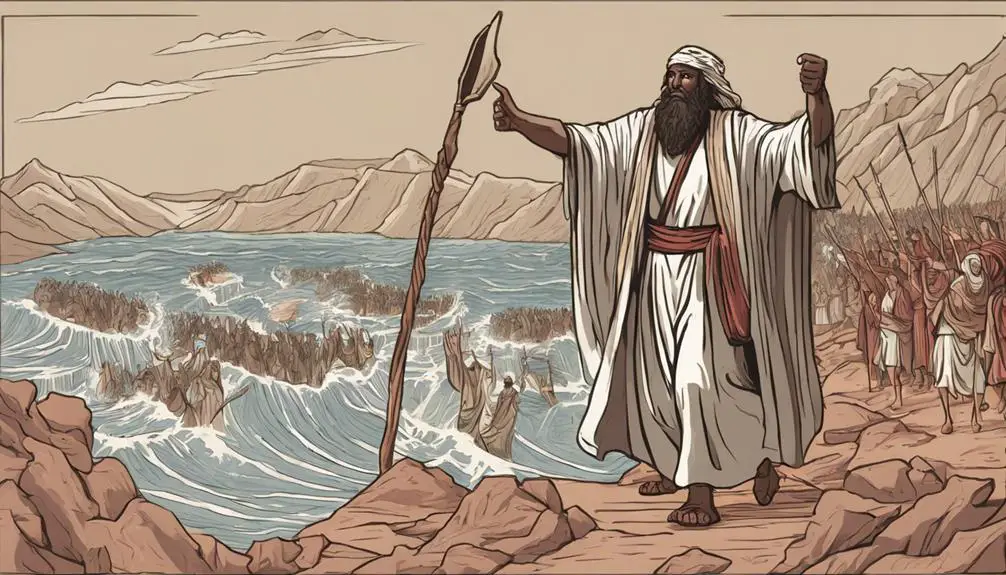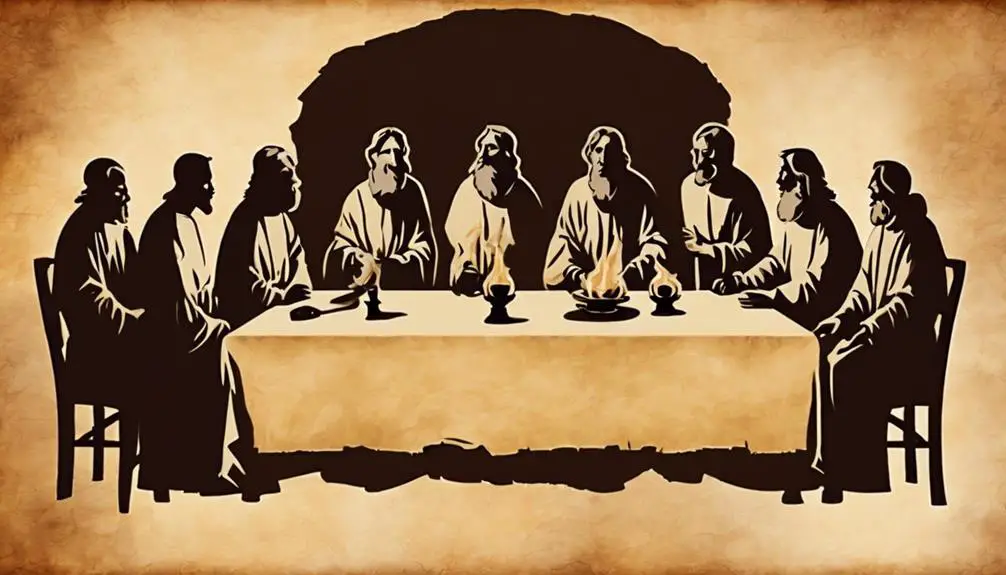Explore the complex tapestry of leadership, servitude, and prophecy in the Bible, where ancient wisdom illuminates modern paths.

Position in the Bible
Imagine walking through a vast, ancient library, where every book tells a story of leadership, servitude, prophecy, and position. In the Bible, these themes intertwine, creating a complex tapestry of roles that have shaped religious thought and practice for centuries.
You're about to embark on a journey through the Old Testament's portrayal of leadership, the humility required of servants, the prophets' unique positions, the significant roles of women, and the apostles' influence in the early church. Each page turn reveals not just historical accounts, but lessons that still resonate today.
Let's explore how these biblical positions can illuminate our understanding of authority, service, and faith.
Key Takeaways
- Leadership in the Old Testament involves a divine mandate and balances divine guidance with human responsibility.
- Servitude and humility are core virtues in biblical leadership, promoting spiritual fulfillment and a closer relationship with God.
- Prophets play a crucial role as divine messengers, emphasizing social justice and guiding community conduct.
- The early Church's foundation and growth highlight inclusivity and the breaking of cultural boundaries, emphasizing the significance of apostles.
Leadership in the Old Testament

How does the concept of leadership manifest within the Old Testament, and what implications does this hold for our understanding of biblical authority? The Old Testament presents leadership as multifaceted, with kingly authority and military strategies being paramount. This perspective enriches our grasp of biblical authority, framing it within the context of divine ordination and human agency.
Kingly authority in the Old Testament isn't merely a symbol of temporal power but signifies a divine mandate. Kings are anointed by God, indicating a sacred aspect to their rule. This intertwining of divine will with earthly leadership challenges modern perceptions of secular authority, suggesting a model where governance aligns with higher moral and spiritual principles.
Moreover, the strategic application of military strategies by Old Testament leaders underscores the importance of wisdom, courage, and tactical acumen. These narratives highlight that effective leadership involves not only the capacity to guide people spiritually but also the ability to protect and advance their welfare through calculated decisions.
Therefore, the Old Testament's portrayal of leadership, through the lenses of kingly authority and military strategies, offers a complex view of biblical authority. It emphasizes a leadership paradigm that balances divine guidance with human responsibility, steering us towards a holistic understanding of what it means to lead and govern according to biblical principles.
Servitude and Humility

While the Old Testament emphasizes kingly authority and military prowess, it equally values the virtues of servitude and humility as foundational to biblical leadership. These qualities aren't merely ethical adornments but are central to understanding divine sovereignty and fostering personal growth. You'll find that the Bible consistently presents servitude as a means to achieve a deeper connection with God, suggesting that through serving others, individuals align themselves more closely with divine intentions.
Humility, too, is depicted not as weakness but as a powerful stance of recognizing one's position relative to the divine. It's a prerequisite for genuine leadership, as it allows for the acknowledgment of God's supreme authority. This recognition of divine sovereignty is crucial for personal growth, guiding individuals on a path that values collective well-being over personal ambition.
The narratives within the Bible that highlight these virtues often involve characters who, despite their flaws, learn to embody servitude and humility. This learning process is portrayed as transformative, leading to significant personal and communal benefits. Thus, the biblical emphasis on these qualities serves as a timeless reminder of the importance of placing service and humility at the heart of leadership, illustrating their role in achieving spiritual fulfillment and societal harmony.
Prophets and Their Role

In the biblical narrative, prophets play a crucial role as intermediaries between the divine and the people, tasked with conveying God's messages and guiding societal conduct. These figures are pivotal in shaping the moral and ethical framework of the communities they address, often challenging prevailing norms and advocating for a return to spiritual values. Divine messages conveyed through prophets aren't merely religious dictums but are deeply intertwined with social justice, calling for reform and repentance.
The path of a prophet is fraught with challenges. They often encounter resistance from those in power and skepticism from the very people they seek to guide. The prophet's challenges extend beyond delivering divine messages; they must also live as exemplars of the virtues they preach, navigating the complexities of human nature and societal structures. Their resilience in the face of opposition and their unwavering commitment to their divine mission underscore the profound impact they've on their communities and the broader course of biblical history.
Analyzing the role of prophets reveals their indispensable contribution to the development of biblical thought and the enduring relevance of their messages in contemporary discussions on morality, justice, and spiritual integrity.
Women's Positions in Scripture

Women's roles in scripture, from matriarchs to prophets, represent a complex tapestry of spiritual authority, societal influence, and divine engagement. These figures navigate through a patriarchal context, yet they assert significant impact, demonstrating virtuous characteristics that transcend their time. For instance, marriage dynamics in scripture often highlight the nuanced power women wield within their households and communities. They're not merely passive figures; rather, they negotiate, influence, and sometimes even subvert societal norms to fulfill divine purposes.
Analyzing these narratives, you'll find that women's positions are pivotal in the unfolding biblical story. Their actions and decisions often propel the narrative forward, illustrating a divine acknowledgment of their role in spiritual and societal spheres. This challenges modern readers to reconsider historical perspectives on women's roles, both within and outside religious contexts.
Moreover, the portrayal of women in scripture with virtuous characteristics—wisdom, courage, faithfulness—serves as an enduring testament to their integral presence in these ancient texts. These stories aren't just historical accounts; they're instructive, providing insights into the complexity of human relationships and the potential for women's leadership in diverse contexts.
Apostles and the Early Church

The early Christian Church witnessed a transformative phase, as apostles and their followers navigated through challenges and opportunities to spread the teachings of Jesus. Key among these was the event of Pentecost, which significantly underscored the apostles' role in establishing the church's foundational beliefs and practices. Pentecost's significance cannot be overstated; it represented the descent of the Holy Spirit, empowering the apostles to preach and perform miracles, marking the birth of the Church.
Another pivotal development was the inclusion of Gentiles, which expanded the church's demographic and cultural scope. This move, initially contentious, eventually underscored the universal message of Christianity, transcending ethnic and cultural boundaries.
Here's an overview of these transformative events:
Event |
Impact |
|---|---|
Pentecost |
Empowered apostles, symbolized Church's birth |
Gentile Inclusion |
Expanded Church's reach, underscored universalism |
These developments were instrumental in shaping the trajectory of the early Church, emphasizing its inclusive nature and the pivotal role of the apostles in disseminating Jesus' teachings across diverse communities.
Frequently Asked Questions
How Does the Concept of "Position" Relate to Modern-Day Christian Leadership Outside of Church Settings, Such as in Business or Government?
In modern-day Christian leadership, whether in business or government, your position isn't just about your role but also involves navigating complex ethical dilemmas.
It's about how you apply leadership styles influenced by Christian principles outside the church. You're faced with the challenge of integrating faith into decision-making processes, ensuring your actions reflect Christian values.
This approach helps address ethical dilemmas by providing a moral compass, guiding you towards integrity and accountability in your leadership role.
Are There Any Biblical Positions or Roles That Are No Longer Recognized or Practiced in Contemporary Christian Communities?
Yes, there are roles like the Temple priesthood and Levitical duties that aren't recognized in modern Christian communities. These positions were vital in ancient practices, focusing on sacrifices and temple rituals, which don't align with contemporary Christian worship.
As Christianity evolved, these roles became obsolete, reflecting a shift towards a more personal and communal relationship with faith, rather than adherence to specific, ancient ceremonial duties.
How Does the Translation of Key Terms Related to "Position" in the Bible (E.G., Servant, Leader, Prophet) Affect Their Interpretation and Application Today?
When you explore how key terms like 'servant,' 'leader,' and 'prophet' are translated, you're delving into the nuances of linguistic evolution and cultural context. These translations significantly influence their modern interpretation and application.
As languages evolve, so do the connotations and meanings of words. Understanding this evolution allows you to grasp how contemporary Christian communities might apply biblical roles differently, reflecting changes in language, culture, and societal norms.
In What Ways Does the Bible Address the Position or Role of Children Within the Family and the Community of Believers?
The Bible addresses the role of children within the family and community by outlining child discipline and inheritance customs. It emphasizes the importance of nurturing and guiding children, suggesting discipline as a means to teach and correct.
Moreover, inheritance customs are discussed, highlighting the transmission of wealth and responsibilities. These elements together shape how children are perceived and their expected contributions, reflecting broader societal values and the historical context of the biblical texts.
How Do Different Christian Denominations Interpret the Concept of Spiritual Gifts and Their Relation to One's Position or Role Within the Church?
Different Christian denominations interpret spiritual gifts and their relation to roles within the church through a lens of gifts diversity and spiritual discernment.
You'll find that some view these gifts as a means to define leadership and service positions, emphasizing a hierarchy.
Others see them as a demonstration of the Holy Spirit's work in all believers, promoting equality and diversity in ministry roles.
This interpretation hinges on discerning and valuing the variety of gifts present in their community.
Conclusion
In analyzing the Bible, it's clear that leadership, servitude, and prophetic roles are pivotal, each embodying unique responsibilities and moral frameworks.
Women's positions, though varied, often reflect broader societal norms yet also highlight instances of profound influence.
The apostles and early church leaders further illustrate the evolution of spiritual leadership within Christian contexts.
Thus, these roles not only shape theological narratives but also offer insights into the dynamics of authority, service, and community within biblical history.



Sign up